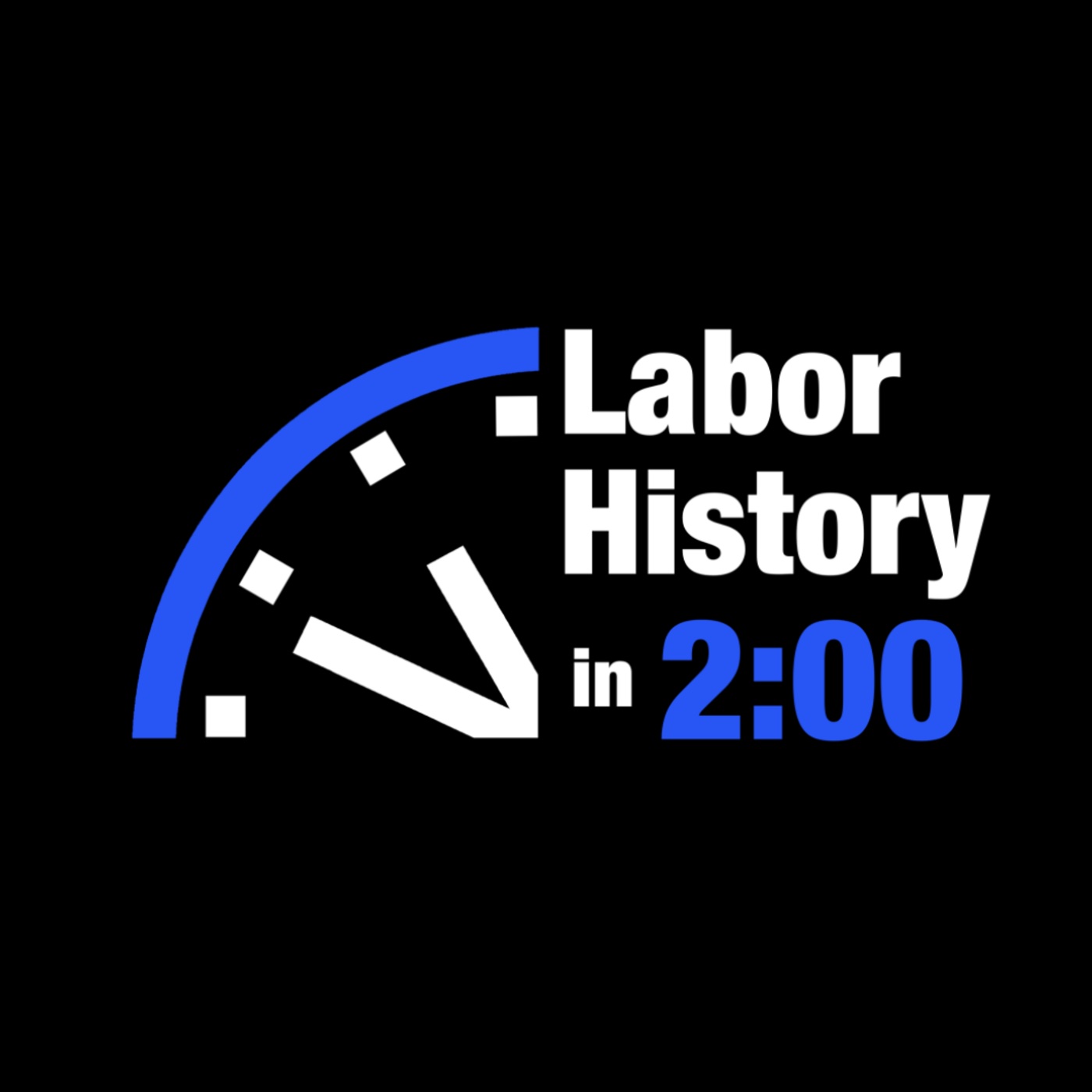Episodes

Sunday Aug 11, 2024
August 11 - The ILWU is Founded
Sunday Aug 11, 2024
Sunday Aug 11, 2024
On this day in labor history, the year was 1937.
That was the day the International Longshoremen’s and Warehousemen’s Union was founded.
After the victorious strike of 1934 that established the union hiring hall,
West Coast union leaders embarked on an inland campaign to organize the thousands of warehouse workers who handled shipped goods.
But West Coast dockworkers overwhelmingly chose to join the CIO after it was expelled from the AFL earlier that year.
They found the ILA planned to abandon the warehouse workers they had worked so hard to organize.
They also opposed dues assessments to fight the CIO and disagreed with the ILA’s hostility to minimum wage laws, social security and unemployment insurance.
Radicals like Harry Bridges and others had established themselves not only as workers leaders but also led attacks on Jim Crow racism in the ranks and in the industry.
The success of the 1934 strike was due in part to the welcoming of blacks into the ranks of the union.
In his Workers on the Waterfront, historian Bruce Nelson notes that, “the ILWU’s well-known opposition to racial discrimination was an important factor in the union’s expansion into Hawaii, not only on the waterfront but among sugar and pineapple plantation workers. The triumph of the ILWU in Hawaiian agriculture brought about a degree of fraternization across racial lines that few had thought possible.”
Since then, the union has beat back numerous Taft–Hartley and McCarthy era attacks.
More recently, the ILWU has been in the forefront of broader social justice struggles, leading walkouts and work stoppages for various political causes.
Today it represents close to 60,000 workers, including those locals that initially refused to affiliate.
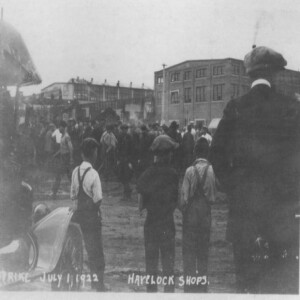
Saturday Aug 10, 2024
August 10 - Illinois Brotherhoods Join the ‘22 Shopmen Strike
Saturday Aug 10, 2024
Saturday Aug 10, 2024
On this day in labor history, the year was 1922.
That was the day 1300 workers from the four railroad brotherhoods walked off the job in Joliet, near Chicago.
The walkout threatened to paralyze freight service for steel mills in nearby Gary and other regional industries.
Four hundred thousand railroad shopmen had been on strike across the country for nearly seven weeks.
Newspaper headlines that day warned a general strike of two million trainmen loomed on the horizon.
Brotherhood leaders promised sympathy strikes in response to threats made against their members by troops on duty at railroad centers and yards.
There were also real concerns about the health and safety of trainmen, given rolling stock was no longer being maintained.
In Joliet, workers stayed away under threats from troops.
Additionally, Illinois Central trainmen faced threats from striking miners throughout Kentucky and Illinois, who warned:
“Stop transporting non-union coal or suffer the consequences.”
Resentment had been building against state guard troops stationed in Illinois yards.
Earlier in the week, striking shopmen had engaged in a fatal confrontation with Joliet sheriffs that left a striker and railroad detective dead and scores injured.
Riot orders were called when authorities sought to arrest striking shopmen who had stormed the home of a scab.
Brotherhood workers refused to return to work unless troops were removed.
Warren Stone, president of the Brotherhood of Locomotive Engineers stated: “We are not going to have our men shot up or beaten up or threatened by armed guards at railroad shops and yards.
When the men cannot go to work without having irresponsible armed guards endangering their lives, they may go home and stay there.
There will be 100 more cases soon if conditions are not changed.”
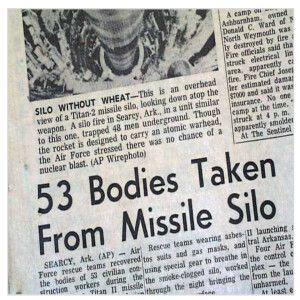
Friday Aug 09, 2024
August 9 - Titan II Fire Kills 53
Friday Aug 09, 2024
Friday Aug 09, 2024
On this day in labor history, the year was 1965.
That was the day fifty-three construction tradesmen were killed in a fire at the Titan II ICBM launch complex near Searcy, Arkansas.
It is considered one of the worst industrial accidents at a U.S. nuclear weapons facility. The complex was one of four sites containing Titan II missiles. Each missile weighed 340,000 pounds, measuring 103 feet in length and 10 feet in diameter.
President Johnson had just committed more troops to the Vietnam War. The Air Force hoped to strengthen the silo against a possible Soviet attack.
They had contracted with Peter Kiewit and Son of Colorado to bring in electricians, carpenters, millwrights, painters and pipefitters for a number of tasks.
Crews worked to shore up the silo, improve the blast doors, adjust hydraulics and install emergency lighting.
52 of 55 workers on all nine levels of the silo were almost immediately asphyxiated when it suddenly filled with smoke and heat.
The Air Force determined a welder on level 2 accidentally pierced a high-pressure hydraulic line, igniting the fire.
Investigators also concluded the silo lacked adequate ventilation, alternative exits and independent power sources.
The contractor was held responsible for numerous safety violations, contributing to unsafe working conditions.
The welder was found drowned in hydraulic fluid.
Two survivors suffered burns and smoke inhalation. They contested the Air Force’s findings. One worker insisted no one had been welding on level 2.
The other survivor stated he saw flames burst from the diesel engine just before the power went out. Both men insisted the fire started from below.
By 1981, two more deadly accidents involving Titan II missiles would prompt President Reagan to order their deactivation.
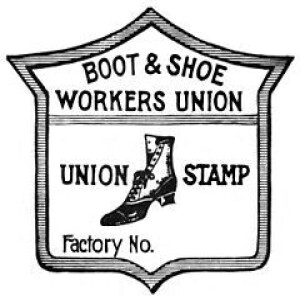
Thursday Aug 08, 2024
August 8 - Twin Cities Trades Elect First Black President
Thursday Aug 08, 2024
Thursday Aug 08, 2024
On this day in labor history, the year was 1902.
That was the day more than 100 trade union delegates representing thousands of working people in St. Paul, Minnesota elected Charles James to be the president of the city’s Trades and Labor Assembly.
Virtually forgotten by history, James is considered to be the first African American elected to a city labor council anywhere in America.
He was born in 1866 in St. Paul and began working as a leather cutter for local shoe manufacturers at age 15.
This was at a time when most African Americans were excluded from skilled trades.
His biographer, Dave Riehle, asserts that it is unclear when James became involved in union politics and organizing.
Shoe making was the largest mass production industry in St. Paul, employing thousands.
Riehle notes the Knights of Labor had been active in the city during the 1880s and shoe workers were among the first to organize.
By 1899, James had become the first president of a newly formed shoe workers union in Minneapolis and helped to found three more locals in St. Paul.
By 1902, James was well known and well respected throughout the Twin Cities as a strong union leader.
He served three terms as president of the Trades Assembly and then as secretary for seven more years.
Riehle states that James continued as full time organizer and district business agent, traveling to cities across the Midwest to organize shoe workers.
When he died in 1923, the Boot and Shoe Workers Union eulogized him in their national journal.
Though James had been obscured from local labor history for decades, Riehle and others have worked to write Charles James back into the history books.
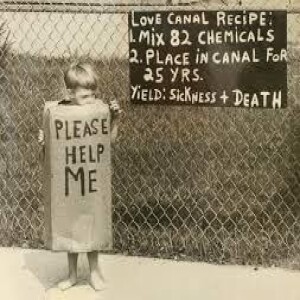
Wednesday Aug 07, 2024
August 7 - Love Canal
Wednesday Aug 07, 2024
Wednesday Aug 07, 2024
On this day in labor history, the year was 1978.
That was the day President Jimmy Carter declared a federal health emergency at Love Canal, in the city of Niagara Falls, New York.
Premier spokeswoman, housewife Lois Gibbs became the poster child for the citizen environmental justice movement virtually overnight.
Niagara Falls Gazette journalists broke the story two years earlier.
Their sump pump testings and health surveys found a number of toxic chemicals and unusually high rates of cancers, birth defects, miscarriages and other serious health concerns.
Initially planned as a canal, the site remained abandoned until the 1940s.
That’s when Hooker Electrochemical Plant and the City began using the site to dispose of toxic chemical and municipal waste.
More than 20,000 tons of toxic sludge containing more than 21,000 chemicals were buried there.
Then, in 1953, the City School Board bought the site and built two schools on the property.
Soon, about 1,000 families settled nearby.
By the early 70s, residents complained of foul odors, health issues, substances filling their basements and leaky waste disposal drums popping up in back yards, killing all plant life.
Class and racial tensions soon emerged among working class white homeowners and black renters, both of whom sought compensation and relocation.
Carter’s initial declaration provided limited funding.
But the disaster led to the passage of the Superfund Act.
The neighborhood was demolished and residents were compensated and relocated.
The new owner of Hooker Chemical, Occidental Petroleum settled with the EPA for $129 million.
Despite 21 years of remediation and residential redevelopment, new residents complained in 2011 of foul odors and ruptured sewage lines oozing toxic sludge.
By 2014, 1,000 new complaints had been filed contending the area had never been properly remediated.
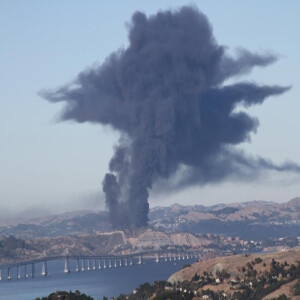
Tuesday Aug 06, 2024
August 6 - Catastrophic Fire at Chevron
Tuesday Aug 06, 2024
Tuesday Aug 06, 2024
On this day in labor history, the year was 2012.
That was the day release of flammable vapor led to a fire at the Chevron refinery in Richmond, California.
A Level 3 Community Warning System Alert was issued for the cities of Richmond, San Pablo and North Richmond.
Toxic black smoke could be seen for miles while the fire burned for hours.
Nineteen workers were nearly incinerated trying to escape the fire.
More than 15,000 area residents sought medical treatment for chest pain, breathing problems, headaches and sore throats.
The Chemical Safety Board found that the release was caused by a leaking pipe that eventually ruptured.
The pipe, made of carbon steel, suffered sulfidic corrosion.
The CSB noted that for 40 years, the refinery industry had known that carbon steel corrodes at a much faster rate than higher chromium content steel pipe.
The pipe in question had no shut off valve to isolate the leak. In its final report, the CSB issued a number of findings.
They found that Chevron knew of the corrosion but did nothing to prevent it.
As well, Chevron not only failed to perform 100 percent component inspections, but also rejected earlier recommendations to inspect and replace the pipe that would eventually fail.
When it came to Emergency Response, Chevron failed to identify and communicate process controls or damage mechanisms in the incident command structure.
They also had no leak response guidance or formal protocol to determine how to handle a process leak.
The CSB found the Safety Culture lacking. Workers were reluctant to use their Stop Work Authority and were often encouraged to continue operations despite hazardous conditions.
The CSB issued a number of recommendations, including more stringent regulatory enforcement.
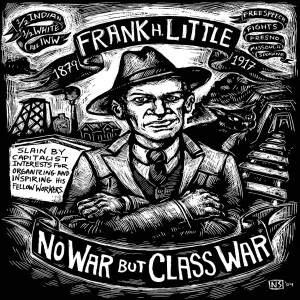
Monday Aug 05, 2024
August 5 - Funeral March for Frank Little
Monday Aug 05, 2024
Monday Aug 05, 2024
On this day in labor history, the year was 1917.
That was the day IWW leader Frank Little was buried in Butte, Montana.
Little had been lynched on August 1, by police agents thought to be working for the despised Anaconda Copper Company.
He had arrived in town to help organize 14,000 striking copper miners.
Devastated by the deaths of 168 miners in the June fire at Granite Mountain & Speculator Mines, mine workers formed the Metal Mine Workers’ Union and walked off the job.
Frank Little had previously worked as a hard rock miner and organizer for the Western Federation of Miners. He also took part in the free speech campaigns on the West Coast.
Little was involved in early drives to industrially organize oil workers and lumberjacks.
He voiced his opposition to the First World War and sought to stop workers from enlisting.
When Little arrived in Butte in July, he worked to build strike support, picket lines and spread the strike to other trades across the city.
Early on August 1, six masked men broke into the boardinghouse where he was staying. He was beaten and taken from his room.
His assailants tied him to the bumper of their car and dragged him through the granite streets of Butte to Milwaukee Bridge, where he was hanged.
An ominous note was pinned to his bullet-ridden body, with the words “Others Take Notice.
First and Last Warning.” It included the numbers 3-7-77 as well as the initials of other union organizers in the area.
As many as 10,000 marched in the funeral procession.
Days after his lynching, martial law was declared.
Labor radicals were rounded up and charged with espionage. The miners strike and union were crushed.
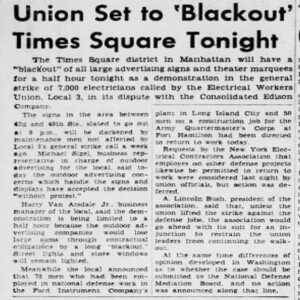
Sunday Aug 04, 2024
August 4 - The Night the Lights Went Out on Broadway
Sunday Aug 04, 2024
Sunday Aug 04, 2024
On this day in labor history, the year was 1941.
That was the day Michael Siegel, Business Agent for New York City’s Local 3, IBEW announced the lights would be going out on Broadway for an half an hour.
Electricians had been on strike for nearly a week to protest Consolidated Edison’s refusal to employ union electricians for work on its new Waterside plant.
The company claimed it could only use members of the Brotherhood of Edison Employees, an ‘independent union.’
The walkout also affected electricians at area construction sites and at 25 defense contractors across the city.
The union had just agreed to exempt electricians at the Brooklyn Navy Yards, where the strike held up work on four battleships.
And the IBEW allowed electricians at Ford Instrument to return to work, given they had orders for $100,000,000 in defense instruments.
Siegel announced that at 9 p.m. the following evening, maintenance men not on strike, would pull the switches on all signs in Times Square in sympathy, to bring attention to their plight.
After the half-hour blackout, the IBEW continued to fight injunctions brought by the New York Electrical Contractors Association.
Harry Van Arsdale Jr., business manager for Local 3, declared the blackout had been more successful than they had hoped.
He characterized the switch-off as a “blackout for enlightenment.”
Naval officials complained however that the strike held up vital defense projects.
Newspapers noted that Broadwayites suddenly noticed the moon when an estimated 10 million watts of super-lighting was turned off.
A Times Square veteran noted it was darkest since 1918, when a Zeppelin raid alarm caused a blackout.
The strike was called off a week later when ConEd acknowledged its previous agreement with IBEW.
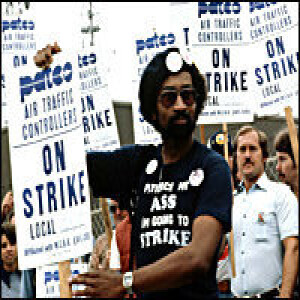
Saturday Aug 03, 2024
August 3 - PATCO Members on Strike
Saturday Aug 03, 2024
Saturday Aug 03, 2024
On this day in labor history, the year was 1981
That was the day 13,000 workers in the Professional Air Traffic Controllers Organization, or PATCO, went on strike.
Highly stressed workers had been driven to nervous exhaustion by long hours, problematic technology and brutal management.
They wanted better pay and working conditions, and a 32 hour work week.
PATCO workers had proven that militancy bred victories throughout the early 1970s.
But public sector employers went on the offensive as the decade drew to a close.
By the time Ronald Reagan was elected to office, automation, deregulation and inflation had taken its toll.
As Joseph McCartin details in his book, Collision Course, controllers found new technology unreliable.
They experienced on average, a computer outage a day, in critical moments of take offs and landings.
As well, the Airline Deregulation Act and the Civil Service Reform Act became laws in October 1978, serving to restrict union rights and worsen working conditions.
By the late 1970s, inflation had tripled.
Federal workers, unlike those in the private sector, lacked any COLA protections.
Emboldened by their skill level, solidarity and previous victories, the controllers walked.
Invoking Taft-Hartley, President Reagan issued a 48 hour back-to-work ultimatum.
In a historic move, he fired the strikers, jailed their leaders and forced costly injunctions that spelled doom for the union and the labor movement.
Many labor activists hoped the Teamsters and Machinists would walk out in support.
Instead the strike was a pivotal moment for labor.
It ushered in an era of unprecedented attacks not seen since the 1930s.
As Robert Weir notes, PATCO’s defeat “touched off a new wave of downsizing, decertification and concessions strikes.”
The labor movement continues to suffer its impact today.
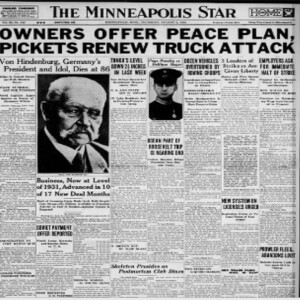
Friday Aug 02, 2024
August 2 - Teamsters 574 Defy Martial Law
Friday Aug 02, 2024
Friday Aug 02, 2024
On this day in labor history, the year was 1934.
That was the day striking Teamsters in Minneapolis defied martial law.
They stopped scab trucks, forcing the release of their strike leaders.
Armed with bayonets and machine guns, the National Guard had patrolled the streets for nearly a week.
They seized scores of strikers and union leaders and threw them into military stockades.
Drivers were outraged.
They defied Governor Olson and Major General Walsh who, on behalf of the Citizens Alliance and trucking bosses, were determined to break the strike.
Soon after strikers were imprisoned, drivers began chasing scab trucks across the city.
Multiple reports poured in of pickets forcing trucks to stop.
Some unloaded their cargo onto bridges.
Others chased, captured and damaged trucks.
Strikers ripped ignition wiring out, forced scabs from the wheel and then disappeared before police and the National Guard could arrive to retaliate.
In just three hours, strikers had overturned nearly 70 trucks.
Unable to stop the superior force of striking drivers, Bill Brown, Vincent and Miles Dunne were ordered unconditionally released from the military stockades.
Now employers, the governor, and other strike breaking agencies were eager to propose peace to federal mediators.
But they proposed to scrap the terms of their early May agreement.
In response, the leaders of Local 574 issued a General Strike call.
In it they asked, “Is there one man so blind as not to see that if 574 is allowed to go down to defeat, under the brutal hammering of military despotism, the whole labor movement of the city will have been dealt a mortal blow?
Union men, brothers, sisters, fellow workers!
What are you going to do about it?
We appeal to you for solidarity!”

